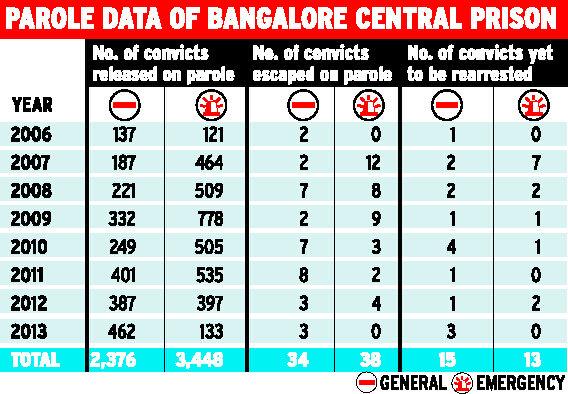The number of convicts released on parole from various prisons in the State has been on the rise from the past eight to10 years with the Bangalore Central Prison alone registering a four-fold increase in grant of parole for general reasons.
According to the statistics submitted recently to the Karnataka High Court by prison authorities , around 2,400 convicts were released on general parole between 2006 and 2013 from the Bangalore Central Prison.
While 137 convicts were granted general parole in 2006 in Bangalore prison, the number increased to 462 in 2013.
In Belgaum jail, 14 convicts were granted general parole in 2009 and the number rose to 34 in 2012–13. Similarly, in Bijapur prison, eight convicts were released on general parole in 2006 and 67 in 2013. As many as 44 convicts were released on general parole from Mysore jail in 2004 and the number rose to 188 in 2012.
Bellary prison, however, has recorded minimum rise in the number of convicts granted parole as the figure varied between 30 and 52 from the past 10 years.
While 121 convicts were released on parole for emergency reasons during 2006 in Bangalore prison, the number increased to 397 in 2012. However, the highest number of emergency paroles, 778, was granted in 2009, followed by 535 in 2010, 509 in 2008, and 505 in 2010 in Bangalore prison.
In Bijapur jail, only four convicts were released on emergency parole in 2004 and the number rose to 365 in 2011, and it dropped to 58 in 2013.
Interestingly, there has been a steep fall in the number of emergency paroles granted in Belgaum jail — from 204 in 2009–10 to 43 in 2012–13.
Stress on ‘liberal parole’
Though the grant of parole to actor Sanjay Dutt and its repeated extension had raised eyebrows, legal experts said that the Supreme Court, in its verdicts from the late 70s, had described that “penological innovation in the shape of parole is claimed to be a success in rehabilitation and checking recidivism.”
The apex court in Maru Ram vs. Union of India case of 1980 observed that “penal humanitarianism and rehabilitative desideratum warrant liberal paroles, subject to security safeguards, and other humanising strategies for inmates so that the dignity and worth of the human person are not desecrated by making mass jails anthropoid zoos…,” said a former State Public Prosecutor.
“Parole is not a suspension of the sentence. The convict continues to be serving the sentence despite released on parole on the promise of consisting good behaviour and after serving part of sentence,” said advocate C.R. Gopalaswamy citing verdicts of the Supreme Court.


